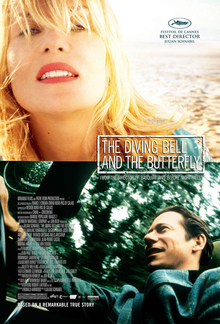This dates from several years ago and is a story that at the time made news headlines around the world about a man who managed to write a book while being paralyzed and able to communicate with the outside world only by blinking one eye. Though obviously romanticized to some extent, it is indeed an excellent film that shows how a person may still have a rich and active mind while the body is paralyzed and succeeds in being emotionally resonant while avoiding trite sentimentality.
Jean-Dominique Bauby wakes up in a hospital and is informed that he has been in a coma for the past three weeks. After some confusion, he is further told that his entire body is paralyzed due to a stroke and he has conscious control only of his left eye. To his horror, a doctor even sews his right eye shut in order to protect the cornea from damage. The doctors realize that despite being unable to speak, his mind is fully active and conscious, so a speech therapist devises a system in which she reads out a string of letters and he blinks to indicate which letter he wants to laboriously spell out messages. A physical therapist also tries to get him to work his tongue so that he can eat normally but it doesn’t seem to be successful. Eventually he becomes adroit at communicating with his eye and gets used to the routine at the hospital, with family and friends often coming to visit him. Before his stroke he was the editor of Elle magazine and had a book deal with a publisher. He decides to write a book by having someone transcript his writing one letter at a time, though the subject is now a memoir of his current condition.
The first third or so of the film attempts to capture the experience of this locked-in syndrome from Bauby’s perspective, seeing the world through a single eye from a fixed location and saying thoughts in his own head that no one else can hear. Once he realizes the extent of his paralysis and how he is cut off from the world, a situation that he likens to being locked inside a diving suit, he retreats to the inner world of his own imagination which the film fully portrays as well. The juxtaposition of the horror of his situation with the somewhat whimsical tone of his private fantasies is beautifully represented by the title of both Bauby’s book and this film and is, I believe, what makes this such a fantastic work of art. While trapped so within his own body, he still yearns and desires, for good food, to run and play, to ruffle the hair of his children, and even has erotic longings. This is far more poignant than simply emphasizing the tragedy itself would be.
I do so admire the film’s frank honesty and its unsentimental treatment of death. Once Bauby masters this communications system, onerous as it is, one of the first things he says is that he wants to die. His therapist rejects this statement angrily, saying that so many people are working to ensure that he lives and gets better. While he certainly wants to get better, being willing to entertain various religious remedies despite not being a believer, he still maintains that there is no point in living if there is truly no hope of recovery. Tragic as Bauby’s eventual death is, it’s hard not to see as a kind of welcome release after he had finished his book. It is also so French that the film maintains a male gaze throughout as Bauby still feels sexual desires and has fantasies about the woman hired to be his transcriptionist. It is however kind of unrealistic how every woman around him seems to be incredibly attractive.
Anyway this truly is an excellent film, far better than the premise would have you think, and is rich in themes and emotions. The revelation of how Bauby once swapped airplane seats with another passenger who would later be taken prisoner after a hijacking makes for a fascinating digression. I do wish there were more in the way of detail of his physical condition, such as how they feed him and what the doctors thought the causes of the sudden seizure might be. Of course, one also can’t help but notice that an incredible amount of money must have been spent on keeping him alive and trying to get him well. In this case, this rare syndrome happened to strike a person who is clearly well-to-do and of course lives in a rich country. How much worse then for someone in a far less privileged position?
